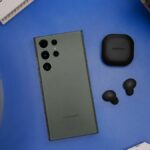
Samsung today announced that it has started the mass production of 256GB embedded memory based on the UFS 2.0 standard for high-end mobile devices. The company believes that its latest NAND chip is able to offer performance that surpasses that of a typical SATA-based SSD for PCs.
Based on its most advanced V-NAND flash memory technology, the 256GB chips come with a specially-designed high-performance controller. The memory is able to handle up to 45,000 and 40,000 I/O operations per second, which is over 2x times faster than previous generations UFS chips.
“By providing high-density UFS memory that is nearly twice as fast as a SATA SSD for PCs, we will contribute to a paradigm shift within the mobile data storage market,” said Joo Sun Choi, Executive Vice President, Memory Sales and Marketing, Samsung Electronics. “We are determined to push the competitive edge in premium storage line-ups – OEM NVMe SSDs, external SSDs, and UFS – by moving aggressively to enhance performance and capacity in all three markets.”
Samsung says that the chip is capable of reading data at up to 850MB/s, while their sequential writing speed can reach as high as up to 260MB/sec. When used in a phone with a USB 3.0 interface, users will be able to transfer a 5GB Full HD clip in just over 12 seconds to the NAND chip.
As if the increased density and speed improvements alone were not enough, Samsung says that its latest UFS memory chips are even smaller than a microSD card, thereby not hindering the creativity of smartphone designers in anyway. Samsung says that it will increase the production volume of its 256GB NAND chips as the global demand for them increases.
I think it is likely that Apple will end up being the first OEM to use these chips from Apple inside the iPhone 7 and iPhone 7 Plus later this year, because with microSD card slot making a return in flagship Android devices this year, it makes little sense for Android OEMs to offer such a high capacity storage variant of their devices.
[Via Samsung]















